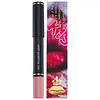What's inside
What's inside
 Key Ingredients
Key Ingredients

 Benefits
Benefits

 Concerns
Concerns

 Ingredients Side-by-side
Ingredients Side-by-side

Dimethicone
EmollientTrimethylsiloxysilicate
EmollientCaprylyl Methicone
Skin ConditioningOctyldodecanol
EmollientSynthetic Wax
AbrasiveLauroyl Lysine
Skin ConditioningDiisostearyl Malate
EmollientPhenylpropyldimethylsiloxysilicate
EmollientDisteardimonium Hectorite
StabilisingPolyethylene
AbrasiveCopernicia Cerifera Wax
Stearyl Heptanoate
EmollientStearyl Caprylate
EmollientPropylene Carbonate
SolventCaprylic/Capric Triglyceride
MaskingPolyhydroxystearic Acid
EmulsifyingPentaerythrityl Tetra-Di-T-Butyl Hydroxyhydrocinnamate
AntioxidantIsostearic Acid
CleansingLecithin
EmollientPolyglyceryl-3 Polyricinoleate
EmulsifyingDicalcium Phosphate
AbrasiveCI 77891
Cosmetic ColorantIron Oxides
CI 15850
Cosmetic ColorantCI 42090
Cosmetic ColorantDimethicone, Trimethylsiloxysilicate, Caprylyl Methicone, Octyldodecanol, Synthetic Wax, Lauroyl Lysine, Diisostearyl Malate, Phenylpropyldimethylsiloxysilicate, Disteardimonium Hectorite, Polyethylene, Copernicia Cerifera Wax, Stearyl Heptanoate, Stearyl Caprylate, Propylene Carbonate, Caprylic/Capric Triglyceride, Polyhydroxystearic Acid, Pentaerythrityl Tetra-Di-T-Butyl Hydroxyhydrocinnamate, Isostearic Acid, Lecithin, Polyglyceryl-3 Polyricinoleate, Dicalcium Phosphate, CI 77891, Iron Oxides, CI 15850, CI 42090
Dimethicone
EmollientTrimethylsiloxyphenyl Dimethicone
Diisostearyl Malate
EmollientSynthetic Wax
AbrasiveTrimethylsiloxysilicate
EmollientOctyldodecanol
EmollientDicalcium Phosphate
AbrasiveC20-24 Alkyl Dimethicone
Skin ConditioningSimmondsia Chinensis Seed Oil
EmollientCopernicia Cerifera Wax
Punica Granatum Flower Extract
Skin ConditioningMoringa Oleifera Seed Oil
EmollientPolyglyceryl-3 Diisostearate
EmulsifyingDisteardimonium Hectorite
StabilisingPropylene Carbonate
SolventPentaerythrityl Tetra-Di-T-Butyl Hydroxyhydrocinnamate
AntioxidantCI 77891
Cosmetic ColorantCI 77491
Cosmetic ColorantCI 77492
Cosmetic ColorantCI 77499
Cosmetic ColorantCI 42090
Cosmetic ColorantCI 15850
Cosmetic ColorantDimethicone, Trimethylsiloxyphenyl Dimethicone, Diisostearyl Malate, Synthetic Wax, Trimethylsiloxysilicate, Octyldodecanol, Dicalcium Phosphate, C20-24 Alkyl Dimethicone, Simmondsia Chinensis Seed Oil, Copernicia Cerifera Wax, Punica Granatum Flower Extract, Moringa Oleifera Seed Oil, Polyglyceryl-3 Diisostearate, Disteardimonium Hectorite, Propylene Carbonate, Pentaerythrityl Tetra-Di-T-Butyl Hydroxyhydrocinnamate, CI 77891, CI 77491, CI 77492, CI 77499, CI 42090, CI 15850
Ingredients Explained
These ingredients are found in both products.
Ingredients higher up in an ingredient list are typically present in a larger amount.
Ci 15850 is the pigment color red. It is an azo dye and created synthetically.
Azo dyes need to be thoroughly purified before use. This allows them to be more stable and longer-lasting.
This ingredient is common in foundations, lipsticks, and blushes. This color is described as brown/orangey red.
It has many secondary names such as Red 6 and Red 7. According to a manufacturer, Red 6 usually contains aluminum.
Learn more about CI 15850Ci 42090 is a synthetic dye created from petroleum. It is used to give a bright blue color to cosmetics, medicine, and food.
Ci 77891 is a white pigment from Titanium dioxide. It is naturally found in minerals such as rutile and ilmenite.
It's main function is to add a white color to cosmetics. It can also be mixed with other colors to create different shades.
Ci 77891 is commonly found in sunscreens due to its ability to block UV rays.
Learn more about CI 77891Copernicia Cerifera Wax comes from a palm tree native to Brazil; another name for this ingredient is Carnauba Wax.
This ingredient is used to thicken texture and also leaves behind a film when applied.
Fun fact: This wax has the highest melting point of all natural waxes and low solubility.
Learn more about Copernicia Cerifera WaxDicalcium Phosphate is an exfoliant.
Diisostearyl Malate is an emollient and most often used in lip products. It comes from isostearyl alcohol, a fatty acid, and malic acid, an AHA.
As an emollient, Diisostearyl Malate helps create a thin film on your skin to trap moisture in. This helps keep your skin soft and smooth.
Dimethicone is a type of synthetic silicone created from natural materials such as quartz.
What it does:
Dimethicone comes in different viscosities:
Depending on the viscosity, dimethicone has different properties.
Ingredients lists don't always show which type is used, so we recommend reaching out to the brand if you have questions about the viscosity.
This ingredient is unlikely to cause irritation because it does not get absorbed into skin. However, people with silicone allergies should be careful about using this ingredient.
Note: Dimethicone may contribute to pilling. This is because it is not oil or water soluble, so pilling may occur when layered with products. When mixed with heavy oils in a formula, the outcome is also quite greasy.
Learn more about DimethiconeDisteardimonium Hectorite comes from the clay mineral named hectorite. It is used to add thickness to a product.
It can also help stabilize a product by helping to disperse other ingredients.
Hectorite is a rare, white clay mineral.
Learn more about Disteardimonium HectoriteOctyldodecanol is a fatty alcohol. It is primarily used to enhance the texture of products.
As an emulsifier, Octyldodecanol helps prevent the oils and waters from separating. It also prevents ingredients from creating foam when shaken.
Octyldodecanol is created by reducing fatty acid to an alcohol.
Due to its high molecular weight, it does not get absorbed into the skin.
Learn more about OctyldodecanolPentaerythrityl Tetra-Di-T-Butyl Hydroxyhydrocinnamate (long name, huh?) is a synthetic antioxidant.
It is used to help stabilize other antioxidants or prevent the color from changing in a product.
As an antioxidant, it helps fight free-radical molecules. Free-radical molecules are capable of damaging our cells and other genetic material. Thus, antioxidants may reduce the signs of aging.
This ingredient is oil-soluble.
Learn more about Pentaerythrityl Tetra-Di-T-Butyl HydroxyhydrocinnamateThis ingredient is a solvent. It helps dissolve active ingredients and alter the texture of products.
Propylene Carbonate is commonly used in makeup and with clay, such as montmorillonite or bentonite.
Studies show this ingredient to be safe for cosmetics. When it is undiluted, it can cause skin irritation. (It is always diluted in skincare and makeup). This ingredient is water-soluble.
Propylene Carbonate is created from propylene glycol and carbonic acid.
Learn more about Propylene CarbonateSynthetic Wax is created from fossil fuels such as natural gas. It is used to enhance texture, adjust pH, and as an occlusive.
It may also be used as an abrasive ingredient to exfoliate the skin.
Synthetic Wax may not be fungal acne safe.
Learn more about Synthetic WaxThis silicone is an emollient. Emollients create a thin film on the skin to prevent moisture from escaping.
It is not soluble in water and helps increase water-resistance in products.
According to a manufacturer, it can blend seamlessly with silicone oils, such as Cyclopentasiloxane.
Learn more about Trimethylsiloxysilicate